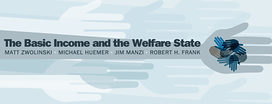Lead Essay
Matt Zwolinski argues that a basic income guarantee (BIG) could very easily do better than our current welfare state by many different criteria. It would be far more efficient. It would be less subject to rent-seeking. It would be easily accessible by the poor, and its benefits would flow to them rather than to the middle class. Although there are many libertarian objections to a BIG, Zwolinski nonetheless argues that when faced with a choice between a BIG and the status quo, libertarians should be open to making the change.
Response Essays
Michael Huemer argues that while a basic income guarantee might be better than the status quo, this amounts to some rather faint praise. A basic income guarantee would necessarily violate some people’s rights, while a fully legitimate government must never violate anyone’s rights. The problem of political authority will likely remain a barrier to all similar proposals, even if we may happen to find this problem’s full implications troubling.
Jim Manzi doubts that a basic income guarantee would emerge from our political process while still bearing its purportedly beneficial features. Compromises would proliferate, as would paternalistic controls. The interests of the bureaucracy would assert themselves, and the temptation to make exceptions would prove overwhelming to the electorate. Moreover, when a basic income guarantee has been tried in practice, the result has consistently been a withdrawal of participants’ labor. Scaled to an entire society, the result of such a withdrawal may be dire.
Robert H. Frank agrees with Matt Zwolinski that a basic income guarantee would achieve the welfare state’s goals more effectively than our current patchwork of programs. But he argues that a basic income guarantee sufficient to end poverty would spawn massive taxpayer resentment. Incentives to work would be undermined both for recipients and for those whose tax dollars funded them. Frank recommends a combination program that would include a significantly smaller cash grant and a standing offer of public employment for any who desired it. Frank defends taxation against libertarian objections and offers several additional taxes that he believes should be implemented. He argues that these should help pay for the expensive programs here being considered.
The Conversation
Letters to the Editor
The Cato Institute’s Michael D. Tanner examines the Basic Income Guarantee and finds that its simplicity wouldn’t survive the political process. Difficulties abound, arising both from practical politics and from the realities of our current welfare expenditures. Tanner recommends consolidating our welfare system and simplifying it, but he does not endorse a Basic Income Guarantee.
Economist Ed Dolan shares some of his findings on the Basic Income Guarantee. He finds that work disincentives will indeed exist under a BIG, and yet these may be smaller than the work disincentives we already experience owing to the welfare state as it now exists. Libertarians should not be tempted by the so-called “gospel of work,” he says; libertarianism, rather, is about the gospel of freedom of choice.
Coming Up
Conversation to follow through the end of the month.
Related at Cato
Podcast: “Libertarians for a Guaranteed Minimum Income?” with Matt Zwolinski, December 5, 2013

